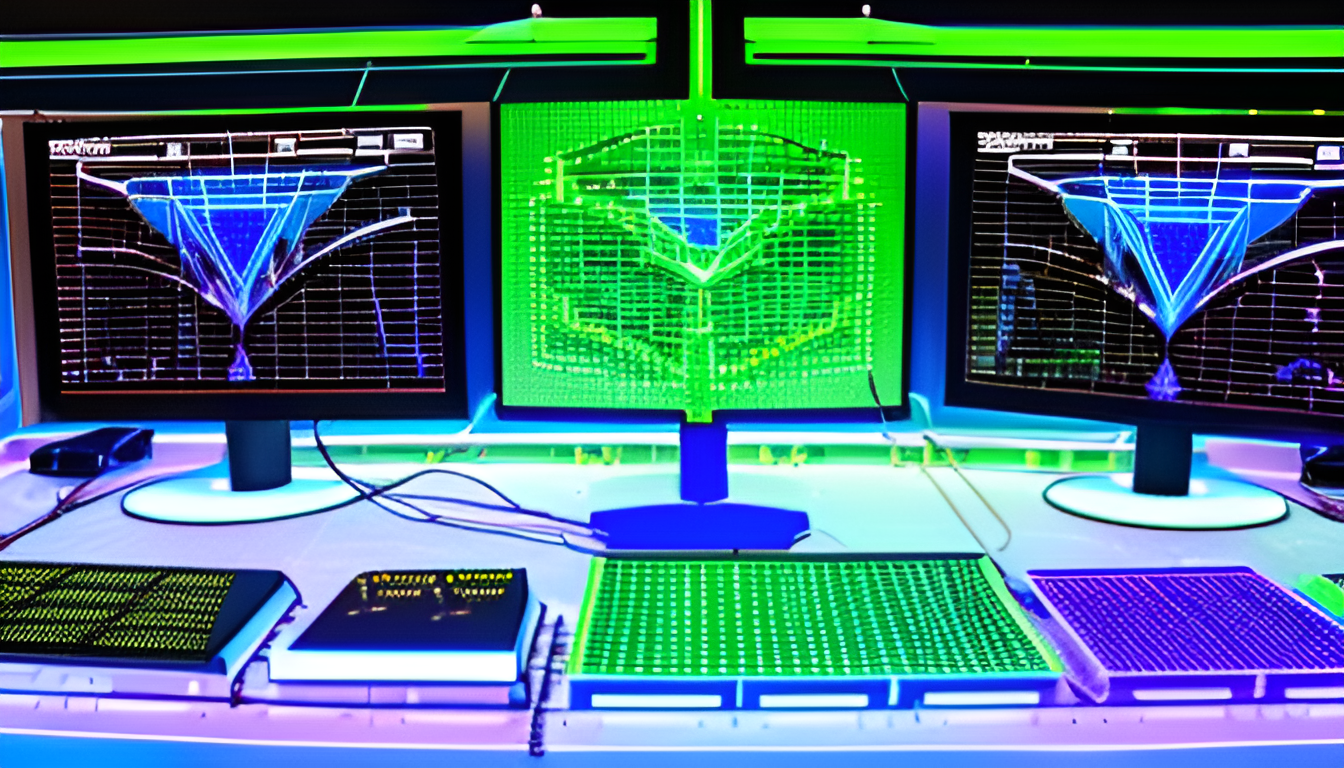AI in Quantum Physics: Aiding Discoveries Beyond Human Capability

The fusion of artificial intelligence (AI) and quantum physics is nothing short of revolutionary. Imagine a world where machines can help us unlock the mysteries of the universe that have baffled scientists for centuries! AI is stepping in as a powerful ally, enhancing research capabilities and accelerating discoveries that push beyond human limitations in understanding complex quantum systems.
At its core, AI offers tools that can process vast amounts of data at lightning speed, something that is crucial in the intricate field of quantum physics. Traditional methods often struggle to keep pace with the sheer volume of information generated by quantum experiments. With AI, researchers can analyze this data more efficiently, leading to insights that were previously thought impossible. The collaborative potential between AI and quantum physics is opening doors to new scientific advancements that could transform our understanding of the universe.
Consider this: just as a skilled navigator uses advanced instruments to chart unknown waters, scientists are using AI to navigate the complex landscape of quantum mechanics. By integrating machine learning algorithms into their research, physicists can identify patterns and correlations in data that would otherwise go unnoticed. This not only enhances their predictive models but also allows them to test hypotheses at an unprecedented scale.
Moreover, the ability of AI to create sophisticated simulations of quantum systems is a game changer. These simulations enable researchers to visualize and manipulate quantum phenomena, providing a playground for testing theories and exploring new ideas. It’s like having a virtual lab where scientists can experiment without the constraints of physical limitations.
As we delve deeper into this fascinating intersection of AI and quantum physics, it becomes clear that we are just scratching the surface of what is possible. The future holds exciting prospects for breakthroughs that could reshape our understanding of reality itself. Buckle up, because the journey into the quantum realm with AI as our guide is just beginning!
The Intersection of AI and Quantum Physics
Artificial Intelligence (AI) is not just a buzzword; it’s a transformative force reshaping various fields, and quantum physics is no exception. Imagine AI as the ultimate sidekick, assisting scientists in tackling the complex puzzles that quantum systems present. The integration of AI technologies into quantum research is akin to adding a turbocharger to a high-performance engine, significantly boosting the capabilities of researchers. By leveraging machine learning algorithms and data analysis techniques, AI is helping physicists unlock the mysteries of the quantum realm, which were once deemed too intricate for human comprehension.
At the heart of this collaboration lies the potential for groundbreaking discoveries. AI can process vast amounts of data at lightning speed, identifying patterns and correlations that would take humans years to uncover. For instance, in quantum experiments, where data can be overwhelming, AI acts as a filter, sifting through the noise to highlight significant findings. This synergy between AI and quantum physics not only accelerates research but also propels us into new scientific territories.
Moreover, the implications of this intersection are profound. As AI continues to evolve, it will likely lead to the development of new quantum algorithms and models that enhance our understanding of quantum mechanics. Picture it as a new lens through which we can observe the universe, revealing phenomena that were previously hidden from our view. The collaborative potential between AI and quantum physics is a promising frontier, poised to redefine the boundaries of scientific inquiry.
In summary, the intersection of AI and quantum physics is not just a meeting of two fields; it’s a dynamic partnership that has the power to revolutionize our understanding of the universe. With every advancement, we inch closer to unraveling the complex tapestry of quantum phenomena, paving the way for innovations that could change the world as we know it.
Machine Learning Techniques in Quantum Research
In the realm of quantum research, the integration of machine learning techniques is nothing short of revolutionary. These advanced algorithms are designed to sift through vast amounts of data, identifying patterns and correlations that would be nearly impossible for human researchers to discern. Imagine trying to find a needle in a haystack, but this haystack is a universe of quantum states and behaviors. Machine learning serves as a powerful magnet, pulling out those needles of insight from the overwhelming complexity of quantum mechanics.
One of the most exciting aspects of machine learning in quantum research is its ability to enhance predictive modeling. Traditional methods often struggle with the non-intuitive nature of quantum systems, where particles can exist in multiple states simultaneously. However, machine learning algorithms excel at handling such complexities. For instance, neural networks can be trained on experimental data to predict outcomes of quantum experiments, allowing researchers to focus on the most promising avenues of inquiry.
Moreover, machine learning techniques can be categorized into several types, each with its unique strengths:
- Supervised Learning: This involves training algorithms on labeled datasets, enabling them to make predictions based on new, unseen data.
- Unsupervised Learning: Here, algorithms analyze data without predefined labels, discovering hidden structures and patterns within the quantum data.
- Reinforcement Learning: This technique allows algorithms to learn optimal actions through trial and error, which can be particularly useful in dynamic quantum environments.
As researchers continue to explore the depths of quantum physics, machine learning is proving to be an invaluable ally. By automating data analysis and improving the accuracy of predictions, these techniques not only save time but also open up new avenues for discovery. The synergy between machine learning and quantum research is paving the way for breakthroughs that could redefine our understanding of the quantum world.
AI-Driven Simulations of Quantum Systems
Imagine having a powerful ally that can help you visualize the unseen world of quantum mechanics. AI-driven simulations are doing just that, transforming how researchers explore and understand complex quantum systems. These simulations act like a sophisticated lens, allowing scientists to peer into phenomena that are typically too intricate or abstract to observe directly.
At the heart of these simulations is machine learning, a subset of AI that excels at recognizing patterns and making predictions based on data. By training algorithms on vast datasets, researchers can create models that simulate quantum behaviors with remarkable accuracy. This capability opens up a new realm of possibilities, enabling scientists to manipulate quantum states and predict outcomes in ways that were previously unimaginable.
For instance, consider the challenge of simulating a quantum particle’s behavior in a multi-particle system. Traditional methods might take an impractical amount of time and computational resources. However, with AI, researchers can:
- Generate quick approximations of complex quantum interactions.
- Explore multiple scenarios simultaneously, accelerating the discovery process.
- Refine their models continuously as new data comes in, enhancing accuracy over time.
Moreover, these AI-driven tools are not just about speed; they also enhance our understanding of quantum phenomena. By visualizing quantum states and their transitions, researchers can gain insights into fundamental principles, such as entanglement and superposition. This not only aids in theoretical research but also has practical implications in fields like quantum computing and cryptography.
As we look to the future, the integration of AI in quantum simulations promises to unlock even more secrets of the quantum realm. With each breakthrough, we inch closer to harnessing the full potential of quantum technologies, paving the way for innovations that could redefine our technological landscape.

Enhancing Quantum Computing with AI
Artificial Intelligence (AI) is not just a buzzword; it’s a game-changer in the realm of quantum computing. Imagine trying to navigate a maze with countless paths—this is akin to developing quantum algorithms, where the sheer complexity can be overwhelming. AI acts like a seasoned guide, illuminating the best routes and helping researchers optimize their approaches. By leveraging advanced algorithms, AI enhances the efficiency of quantum computing in several remarkable ways.
One of the most significant contributions of AI in this field is its ability to optimize algorithms. Quantum computers operate on principles that are fundamentally different from classical computers, and crafting algorithms that can efficiently solve quantum problems is a daunting task. AI helps streamline this process by analyzing vast datasets and identifying patterns that humans might overlook. For instance, AI can evaluate the performance of various quantum algorithms, determine which ones yield the best results, and suggest modifications to improve their efficiency.
Moreover, error correction is a critical aspect of quantum computing, as qubits are notoriously fragile and susceptible to errors. AI plays a pivotal role in developing sophisticated error correction techniques. It can predict potential errors before they occur by analyzing historical data from quantum experiments. This proactive approach not only enhances the reliability of quantum computers but also accelerates their practical application in real-world scenarios.
To illustrate, consider the following table that summarizes the benefits of AI in enhancing quantum computing:
| AI Contribution | Description |
|---|---|
| Algorithm Optimization | Improves the performance of quantum algorithms through data analysis. |
| Error Correction | Predicts and mitigates errors in quantum computations. |
| Simulation and Modeling | Facilitates the visualization of complex quantum systems. |
As we look to the future, the integration of AI and quantum computing promises to unlock new frontiers in technology and science. The synergy between these fields not only enhances computational power but also opens up opportunities for solving problems that were previously deemed unsolvable. It’s an exciting time for researchers and enthusiasts alike, as the possibilities are as boundless as the quantum realm itself.
Data Analysis and Pattern Recognition
In the fascinating realm of quantum physics, data analysis and pattern recognition play pivotal roles in unveiling the mysteries of the quantum world. With the explosion of data generated from quantum experiments, traditional methods of analysis often fall short. This is where artificial intelligence (AI) steps in, transforming how researchers interpret complex datasets. Imagine trying to find a needle in a haystack; AI not only finds that needle but can also reveal the intricate patterns that led to its discovery.
Machine learning algorithms, a subset of AI, are particularly skilled at sifting through vast amounts of data to identify trends and correlations that human researchers might overlook. For instance, in quantum mechanics, these algorithms can analyze the results of particle collisions or quantum state measurements, providing insights into phenomena that are otherwise too subtle or complex to discern. The ability of AI to recognize patterns in data allows scientists to formulate new hypotheses and refine their experimental approaches.
One notable example is the use of deep learning techniques to analyze quantum entanglement. Researchers have demonstrated that neural networks can predict entangled states with remarkable accuracy, enabling them to explore the boundaries of quantum theory. This capability is akin to having a supercharged assistant that can process and analyze information at lightning speed, allowing physicists to focus on the bigger picture rather than getting bogged down in the minutiae of data.
Furthermore, the integration of AI in data analysis is not just about efficiency; it’s about enhancing the quality of discoveries. By employing advanced algorithms, researchers can uncover unexpected patterns that may lead to groundbreaking findings. For example, AI-driven analysis has been instrumental in identifying new materials for quantum computing, showcasing its potential to revolutionize the field.
As we look to the future, the synergy between AI and quantum physics promises to unlock even more profound insights. The collaboration between these two fields will not only accelerate the pace of research but also deepen our understanding of the universe’s fundamental principles. In essence, AI is not just a tool; it is becoming an essential partner in the quest for knowledge in the quantum realm.
Ethical Considerations in AI and Quantum Physics
The integration of artificial intelligence in quantum physics is not just a leap in scientific advancement; it also raises significant ethical concerns that we must address. As we stand on the brink of a new era where machines can outperform human capabilities in understanding complex quantum systems, we must ask ourselves: are we ready for the consequences? The potential for bias in AI algorithms is one of the most pressing issues. If the data fed into these systems is flawed or skewed, the results can lead to misleading conclusions, which may affect critical research outcomes.
Moreover, the accountability of AI decisions in quantum research poses another ethical dilemma. Who is responsible when an AI-driven experiment yields unexpected or harmful results? Is it the developers, the researchers, or the institutions that deploy these technologies? These questions highlight the need for clear guidelines and regulations surrounding the use of AI in scientific research.
Another area of concern is the potential for misuse of advanced technologies. As quantum computing capabilities grow, so does the risk of these tools being used for malicious purposes, such as breaking encryption or conducting cyber-attacks. It’s essential to establish a framework that ensures these powerful tools are used responsibly and ethically.
To navigate these challenges, we should consider the following ethical principles:
- Transparency: Researchers must be open about how AI systems are developed and the data they use.
- Fairness: Ensuring that AI applications do not perpetuate existing biases or inequalities in quantum research.
- Accountability: Establishing clear lines of responsibility for AI-driven decisions and outcomes.
- Security: Implementing measures to prevent the misuse of AI and quantum technologies.
In summary, while AI holds the promise of revolutionizing quantum physics, we must tread carefully. Ethical considerations are not merely an afterthought; they are foundational to the responsible advancement of science. As we harness the power of AI, let’s ensure that our pursuit of knowledge aligns with our moral responsibilities.
Case Studies: Successful AI Applications
In the rapidly evolving landscape of quantum physics, artificial intelligence (AI) is proving to be a game-changer. One notable case study involves a collaboration between researchers at the University of California and a tech giant, where AI algorithms were employed to analyze quantum data from particle accelerators. This partnership led to the discovery of previously unobserved particle interactions, showcasing how AI can enhance our understanding of the subatomic world.
Another fascinating example comes from a team at MIT that utilized machine learning techniques to optimize quantum algorithms. By training AI models on extensive datasets of quantum states, the researchers achieved a significant reduction in computational time for complex simulations. This breakthrough not only accelerated their research but also paved the way for more efficient quantum computing applications in the future.
Moreover, a project at IBM demonstrated the potential of AI in error correction within quantum computers. By implementing deep learning models, the team was able to identify and correct errors in quantum circuits with remarkable accuracy. This advancement is crucial, as error correction is one of the major hurdles in developing practical quantum computers.
To illustrate the impact of these applications, here’s a brief overview of key case studies:
| Case Study | Application | Outcome |
|---|---|---|
| UC Collaboration | Data Analysis | Discovery of new particle interactions |
| MIT Optimization | Algorithm Improvement | Reduced computational time |
| IBM Error Correction | Deep Learning | Enhanced accuracy in quantum circuits |
These case studies highlight the immense potential of AI in quantum physics. By bridging the gap between complex data analysis and practical applications, AI not only aids in groundbreaking discoveries but also revolutionizes how researchers approach quantum mechanics. As we look to the future, the integration of AI in quantum research promises to unveil even more astonishing insights into the fabric of our universe.

The Future of AI in Quantum Physics
The future of AI in quantum physics is a landscape bursting with potential and excitement. As we stand on the brink of significant technological advancements, the synergy between these two fields promises to unlock mysteries that have long eluded scientists. Imagine a world where quantum phenomena can be predicted with astonishing accuracy, leading to breakthroughs in everything from materials science to cryptography. The integration of AI into quantum research is not just a trend; it’s a revolution that could redefine our understanding of the universe.
One of the most thrilling aspects of this future is the development of autonomous quantum systems. These systems, powered by advanced AI algorithms, could analyze vast datasets at lightning speed, uncovering patterns and insights that human researchers might miss. Picture AI as a master detective, piecing together clues from the complex tapestry of quantum mechanics. This capability will not only accelerate discoveries but also enhance our ability to manipulate quantum states, paving the way for innovations in quantum computing and communication.
Moreover, the collaboration between AI and quantum physics is poised to address some of the most pressing challenges in the field. For instance, error correction in quantum computing has been a significant hurdle. AI can optimize these processes, making quantum computers more reliable and efficient. The implications are staggering: a future where quantum computers could solve problems deemed impossible today, from drug discovery to climate modeling.
However, as we embrace this future, we must also tread carefully. The intersection of AI and quantum physics raises ethical questions that cannot be ignored. Issues such as bias in AI algorithms and the accountability of autonomous systems are critical. As we venture into this new frontier, fostering a culture of responsibility and ethical consideration will be essential.
In summary, the future of AI in quantum physics holds the promise of extraordinary advancements and discoveries. By harnessing the power of AI, we are not just enhancing our research capabilities; we are embarking on a journey that could transform our very understanding of reality itself. The excitement is palpable, and the possibilities are endless!
Collaborative Efforts in AI and Quantum Research
The fusion of artificial intelligence and quantum physics is not just a solitary endeavor; it thrives on collaboration. Academic institutions, tech companies, and research organizations are joining forces to push the boundaries of what we can achieve in this fascinating field. Imagine a vibrant ecosystem where brilliant minds come together, sharing ideas and resources, much like a symphony orchestra where each instrument contributes to a harmonious masterpiece.
These collaborative efforts are essential for fostering innovation and accelerating discoveries. For instance, universities are partnering with leading tech giants to develop cutting-edge algorithms that can analyze quantum data more effectively. This partnership not only enhances the research capabilities of academic institutions but also provides tech companies with access to fresh insights and innovative approaches. It’s a win-win situation that propels both parties forward.
Moreover, the establishment of research consortia is becoming increasingly common. These consortia often include a mix of universities, industry leaders, and government agencies, pooling their expertise and resources to tackle complex problems in quantum research. By working together, they can address challenges that would be insurmountable for any single entity. For example, consider the development of new quantum algorithms that require extensive computational resources and diverse expertise. Collaborations can expedite this process, leading to breakthroughs that benefit the entire scientific community.
To illustrate the impact of these collaborations, let’s take a look at a recent project:
| Project Name | Collaborating Entities | Focus Area | Outcome |
|---|---|---|---|
| Quantum AI Initiative | MIT, IBM, Google | Quantum Machine Learning | Developed new algorithms that improved predictive accuracy by 30% |
In conclusion, the collaborative efforts in AI and quantum research are not just enhancing scientific inquiry; they are reshaping the landscape of technology and knowledge. As we continue to witness the power of teamwork in this domain, the future looks promising, filled with potential discoveries that could redefine our understanding of the universe.
Frequently Asked Questions
- How is AI transforming quantum physics research?
AI is revolutionizing quantum physics by enhancing research capabilities, enabling faster discoveries, and uncovering insights that go beyond human comprehension. It’s like having a supercharged assistant that can analyze complex data and identify patterns that researchers might miss.
- What machine learning techniques are used in quantum research?
Various machine learning methodologies, such as neural networks and support vector machines, are employed to analyze large datasets in quantum research. These techniques help improve predictive models, making it easier for scientists to understand quantum mechanics.
- Can AI create simulations of quantum systems?
Absolutely! AI plays a crucial role in developing sophisticated simulations that allow researchers to visualize and manipulate quantum phenomena, which are often difficult to observe in real life. Think of it as a virtual playground for quantum mechanics!
- How does AI enhance quantum computing?
AI significantly improves quantum computing by optimizing algorithms and correcting errors, which are essential for the practical development of quantum computers. It’s like having a mechanic fine-tuning a high-performance car to ensure it runs smoothly.
- What ethical considerations arise with AI in quantum physics?
As AI becomes more integrated into quantum physics, issues such as bias, accountability, and the potential misuse of technology come into play. Researchers must navigate these ethical waters to ensure responsible use of AI in scientific inquiry.
- Are there real-world examples of AI in quantum physics?
Yes! There are several case studies showcasing successful AI applications in quantum physics, demonstrating how these technologies have led to groundbreaking discoveries and advancements in the field.
- What does the future hold for AI in quantum physics?
The future of AI in quantum physics looks promising, with emerging trends and potential challenges that could reshape scientific exploration. Collaboration between institutions and tech companies will be key to unlocking new frontiers in this exciting field.













